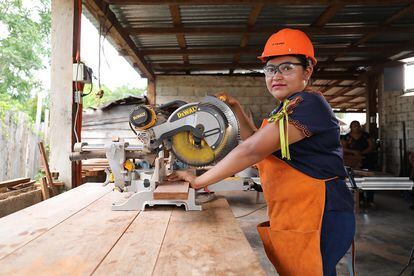Woman carpenter in Mexico. Jessica Belmont
Today, the progress made in terms of closing the gender gap in Latin America and the Caribbean is at risk of being reversed.
Women and girls in the region are seeing their opportunity to reach their full potential curtailed as a result of the persistent impacts of the pandemic, inflation, brewing war, and rising climate risks.
International Women's Day, March 8, also marks the second anniversary of coronavirus-related restrictions imposed around the world.
As the countries of Latin America and the Caribbean emerge from the pandemic, it is a good opportunity to issue a strong call to action: women must be at the center of the post-Covid recovery.
The last two years have been difficult for everyone, although they have been particularly difficult for women.
They have also been the most affected in terms of job and income losses.
A World Bank study using high-frequency surveys warned last year that working women in Latin America were 44% more likely than men to lose their jobs at the start of the crisis.
As the situation evolved, workers who had temporarily lost their jobs began to return to work.
But the difference between men and women persisted.
A year later, a new round of surveys continues to show discouraging results: job losses are much higher (2.5 times) among women than among men.
Why is it so difficult for women to recover from this crisis?
An increase in family care tasks and the slow recovery of sectors that mainly employ women partly explain these numbers.
Despite the difficult situation, I am confident that we will be able to reverse this scenario in the same way that we had been doing it before this pandemic, when the countries of the region were making significant progress in terms of closing the persistent gender gaps.
Indicators from our Gender Scorecards, a resource that compares gender data across 29 Latin American and Caribbean countries across indicators of human capital endowment, economic opportunity, and voice and agency, describe a region that was moving steadily toward a more balanced participation between men and women in decision-making structures.
For example, between 2000 and 2020, the percentage of seats held by women in the Bolivian legislature increased from 11.5% to 46.2%, 24.4 percentage points above the average for low- and middle-income countries.
The advances made by women in terms of educational attainment are indisputable.
In many countries, women have narrowed the gender gap in educational attainment to even outperform men in secondary and tertiary enrollment and completion rates.
For example, in Jamaica, young women are slightly more likely than young men to complete lower secondary (84.7% vs. 83.4%, respectively).
empower women
Achieving gender equality requires creative policies and strong commitment.
The pandemic seems to have led to small positive changes in some important dimensions of female empowerment.
An important change is that men increased their participation in unpaid housework and family care, initially as a result of the lockdowns, and later during the pandemic.
Although the percentage of individuals reporting an increase in the time they spend caring for the family continues to be higher among women than men throughout Latin America and the Caribbean (53% and 42%, respectively), the greater participation of men in care tasks represents an opportunity to ensure that this change is permanent and, eventually, that this type of work is distributed equitably.
The pandemic has also accelerated the pace at which countries are adopting digital technologies, leading to a nearly tenfold increase in the frequency of telecommuting in the region.
This work modality entails certain advantages, especially for women, such as flexible working hours and the possibility of reconciling paid work with family care responsibilities.
Importantly, as evidence mounts, governments and the private sector are gaining new insights into how this pandemic is transforming the lives of men and women, taking appropriate action to address existing gaps.
For example, Colombia passed measures prohibiting discrimination against women's access to employment, introduced shared parental leave, and increased the length of parental leave to encourage fair sharing of unpaid family care.
In Ecuador, Produbanco, a large local bank, is providing new loans to businesses—particularly women-owned micro, small, and medium-sized enterprises (MSMEs)—whose cash flows have been disrupted by the COVID-19 pandemic.
We can and must still do much more, for the benefit of all: achieving gender equality could raise human capital by 21.7% globally and total wealth by 14%.
The best way to celebrate International Women's Day is by taking immediate action to promote gender equality, now that the worst of the pandemic is over, in order to ensure a more inclusive and sustainable future.
And women must be at the center of that future.
Carlos Felipe Jaramillo
(@CF_Jaramillo) is Vice President of the World Bank for Latin America and the Caribbean.



/cloudfront-eu-central-1.images.arcpublishing.com/prisa/EMYXC3EVHNEG3OJHGIQCB2IVYA.jpg)
/cloudfront-eu-central-1.images.arcpublishing.com/prisa/GSAG3AFDE5GZ7CR5RU42LT63UM.jpg)


/cloudfront-eu-central-1.images.arcpublishing.com/prisa/T4QKQ3QU3T2KZ7ZVQCYFWKRXZA.jpg)

/cloudfront-eu-central-1.images.arcpublishing.com/prisa/4PKPLHZOXBG5TEAQ6JNDTUJXBA.jpg)